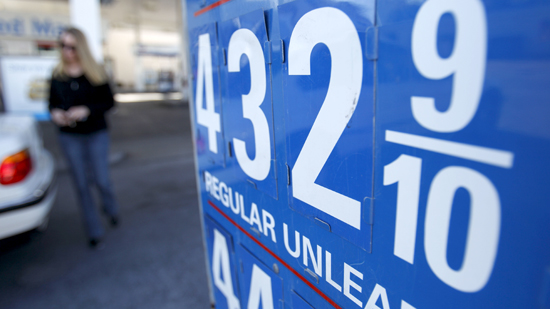Cost at the Pump: Impact of Rising Oil Prices
Q&A with UAlbany Distinguished Professor of Economics Kajal Lahiri

Gas prices in the U.S. continue to climb amid unrest in the Middle East. (Gregory Bull/Associated Press)
ALBANY, N.Y. (March 15, 2011) --
The price of gasoline has risen dramatically in the last month, raising concerns of a "double dip" recession in the United States. UAlbany Distinguished Professor of Economics Kajal Lahiri discusses why the price of gasoline has spiked and when American drivers can expect some relief.
Q: What role does unrest in the Middle East have on rising oil prices?
A: A lot. The Middle East tensions create uncertainty about future in the minds of oil traders, which in turn increase future prices of oil, metals, etc.
Q: How does a rise in the price-per-barrel cause the price at the pump to rise?
A: When oil refineries have to pay a higher price of crude oil, their production costs increase. This gets transferred to the consumers whenever the market conditions allow the refineries to do so. A rough rule-of-thumb is that a $1 increase in a barrel of oil translates into 2.4 cents increase in the price of a gallon of gasoline in 4-6 months.
 |
UAlbany Distinguished Professor of Economics Kajal Lahiri (Photo Mark Schmidt) |
Q: Are there any other factors causing oil prices to rise?
A: The western economies have been slowly recovering from the Great Recession. Some economies in Europe, like Germany, are expecting very good years. The BRIC (Brazil, Russia, India and China) countries started recovering faster and much earlier. All these factors led to a slow but steady increase in world-wide demand for oil.
Q: When will oil prices likely recede?
A: I do not expect any permanent relief from the current level of gas prices until next fall. However, I do not expect oil prices to go through the roof any time soon either.
Q: What impact does the spike in oil prices and the price at the pump have on the national economy?
A: Historically, big oil and gas price hikes have been followed by general economic slowdowns and recessions. If gas price exceeds (on average) $4 per gallon, it will certainly cut deep into our pocket books. In addition, volatility in the oil market creates uncertainty for the future. That uncertainty, by itself, contributes to a general economic malaise and faltering consumer sentiment. Also, current political instability in the Middle East can affect our economy, including the stock and labor markets. The recent gains in employment may stall as a result. But we haven't reached that point yet.
![]() For more news, subscribe to UAlbany's RSS headline feeds
For more news, subscribe to UAlbany's RSS headline feeds
Educationally and culturally, the University at Albany-SUNY puts "The World Within Reach" for its 18,000 students. An internationally recognized research university with 58 undergraduate majors and 128 graduate degree programs, UAlbany is a leader among all New York State colleges and universities in such diverse fields as public policy, nanotechnology and criminal justice. With a curriculum enhanced by 300 study-abroad opportunities, UAlbany launches great careers. For more information about this globally ranked University, visit https://www.albany.edu/. For UAlbany's extensive roster of faculty experts, visit www.albany.edu/news/experts.shtml.


